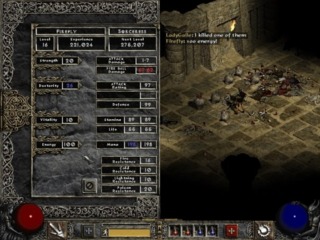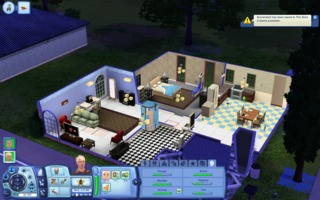Attributes
A Brief History & Explanation
The existence of “attribute points” predates video games entirely. Attribute points are a carryover from popular pen-and-paper games such as the Dungeons & Dragons series. While the attribute point is still most widely used in its deeply rooted historical game genre, the Role Playing Game, this concept is not wholly confined to just this genre. Today, many games with “progressive character development” or Leveling Up, possess attribute points. Some games do not even have a standard leveling system in them but still use attribute points to good effect; one major example would be The Sims franchise.
Attributes are representations of areas where a game character is proficient (or deficient) and many times these restrictions will either allow or disallow a character from using an item, weapon or skill within the respective game. Another use of attribute points is to make a character who does have access to a particular item, weapon or skill to be better or worse at using it based on his attribute points. To illustrate this idea, imagine you are playing a game where you have a Warrior character. He finds an axe and can equip it. His Strength attribute is 15 and he is doing 15 damage with the axe. After finding the axe, your Warrior levels up and he gains 5 more strength points. Now he has 20 strength and does 20 damage with his axe. This is just one very simplistic example of how attribute points can be used in games.
Developer Use
Developers use attributes in many ways. One reason for using player appointed attribute points is it gives the player a sense of control over their character and his/her development and forces them to make decisions about where to spend their limited attribute points. Attribute points also allow developers to ensure that high-end gear is not easily accessible and that not everyone can use the same gear by having different requirements. This promotes different gear and builds on characters and negates stagnation. Today, more and more, developers are assigning points automatically to characters. This has been very popular with MMORPGs recently and is now spreading to non-MMOGs as well. Developers are doing this to "streamline" the game more for the players so they have less to worry about on the back-end and can continue to worry about actually "playing" the game; many purist RPG players would argue that assigning these points themselves is a huge part of the game and a very big incentive to leveling up one's character.
Below is a more comprehensive list with more examples of attributes.
Common Attributes
Strength
Strength is the attribute favored by the standard warrior type, be it knight, barbarian, or any other explicit melee class. Strength often determines the amount of damage done by a physical attack, or can be needed to equip specific weapons and armor.
Agility
Agility can often effect several different statistics, but is often used by rogue classes. Be they assassins, archers or flat out rogues, agility often adds damage to their attacks. However, in a more broad sense, it can apply to the ability to dodge or parry incoming attacks, or increase critical damage. Also known as "Dexterity"
Intelligence
Often seen alongside magic, or replacing it, intelligence is often used as an indicator of how many magic spells a character can cast a day, before they run out of mana (Which intelligence can often represent). However, in more recent years, it has been used to determine if a character can detect traps/locked doors. A common caster trait.
Defense
Defense is the amount of damage absorbed by the armor the character is wearing. Also known as AC, or "Armor class", defense refers to the collection of armor being worn by the character, and how well it will shield them. A useful statistic for tank classes. Also known as "Constitution"
Magic
Magic is used by many character types and classes. Whether it's the exponential increase of damage done by damaging classes, such as mages, warlocks and sorcerers, or the amount healed by a friendly healer such as a priest, or a cleric , the magic attribute often reflects the amount done by healing or damaging spells.
Vitality
Or sometimes, HP (which stands for hit points) is essentially the lifeforce of your character. Once this number hits zero, your character will die. The higher this number is, the better, making it favorable for melee fighters, especially "Tanks"
Critical Chance
Critical chance refers to the chance of a critical strike in combat. Critical strikes increase damage by a substantial amount, ranging from 1.5 times damage, all the way up to 10, and more. This attribute is often favorable for characters that attack fast, such as dual wielding classes.
Luck
The definition of luck varies from system to system. Sometimes, it can be used to determine the chance the player will find a rare item. Sometimes, it can be used to work out the chance that they will dodge a critical attack, suffer a status debuff, and many other things. Luck is usually the catch 22 for all other statistics, never explicitly stating what it does in its entirety.
Examples of Attributes in Games
Traditional Usage
 Traditional Style Attributes
Traditional Style Attributes Attribute points are considered an “
RPG element” and the first attribute points are still common in games today. The basics, as mentioned above are Strength, Agility, Intelligence and Vitality. Some games have more or less attributes such as a Luck attribute or an Endurance attribute. These are just some of the variations on the common attributes. In the computer game
Diablo II, players could level up and distribute points into their stats or attributes to customize their character's strength, dexterity, vitality and energy. All of the attributes are here to grow your adventurer in power.
Attributes outside of traditional RPGs
 A spin on the traditional attributes.
A spin on the traditional attributes. As mentioned previously,
The Sims franchise makes use of the attribute point system despite not being a traditional RPG. The Sims has attributes of:
Hunger, Bladder, Comfort, Hygiene, Energy, Fun, Social, and Room. In The Sims 3, the "Room" attribute has been removed.
In the Sims, a character's attributes upon creation will dictate whether they are tidy or messy, friendly or mean, and various other aspects pertaining not to an adventurer, but to an every day person.
Log in to comment